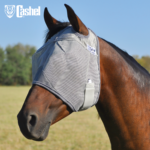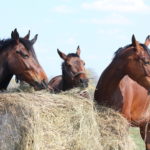
Is your horse obese? According to Sciencedaily.com, horses suffer from obesity just as humans do, and a significant percentage are overweight.
Obesity in horses can cause some of the same problems as found in overweight people: endocrine problems, heart disease and insulin issues similar to human diabetes. And of course, overweight horses are at risk of founder and laminitis.
To put your horse on his New Year’s diet, keep the following items in mind:
-Check with your veterinarians to develop a proper nutritional plan for your fat horse. -Weight loss takes time. Patience is important.
-Horses have delicate digestive systems. Make any changes in feed slowly over a ten to 14-day period. If you are changing his grain, mix in a little of the new food each day, gradually increasing the new and reducing the old over a long period of time.
-Increase your horse’s exercise regime (again, take it slow).
-Make sure he’s getting enough nutrition. A reduction in feed might also mean a reduction in nutrients. Supplement as necessary.
-Keep track of his weight with a weight tape and keep a diary of his rations, exercise and weight over a long period.
-Once he’s reached an ideal weight, stabilize his feeding routine for several months. Make sure he’s maintaining his healthy weight and not losing any more.






